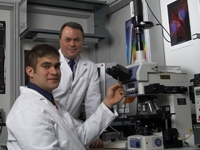Last year, Weill Cornell physician-researchers Dr. Ronald Crystal and Dr. Shahin Rafii gave a pair of lectures on genomics and stem cell biology at Weill Cornell Medical College–Qatar that had a kind of mythic effect on the students.
"They were the best lectures of my life," Zeinab Ammous, a WCMC-Q student, said.
"One talked about gene therapy and the other about stem cells, and they were fascinating," said Imran Farooq, another WCMC-Q student. "It captivated me."

Zeinab Ammous and Dr. Ronald Crytal in the lab where they are working together to better understand the effects of the environment on gene expression in patients with respiratory diseases. Photo by Amelia Panico.
One academic year later, Ammous and Farooq are conducting research in genomics and cancer biology at Weill Cornell's Sheikh Hamad bin Khalifa Al-Thani Biomedical Research Building in New York City as a result of those lectures, addressing the very issues that initially captivated them through hands-on experience and multidisciplinary collaboration.
The students are two of the six currently working at Weill Cornell's New York campus as part of the Summer of Discovery program. Now in its second year, the program provides research and clinical experience to WCMC-Qatar students and fosters the exchange of ideas and techniques between campuses. Acceptance into the program is competitive—all 58 WCMC-Qatar students applied—and all students must designate their lab of choice when applying.
Dr. Crystal's lab, in which Ammous is studying, is exploring the relationship between the environment and gene expression in airway epithelial cells in order to better understand genetic susceptibilities to lung diseases like asthma, lung cancer and chronic obstructive lung disease. Currently, samples are being collected in both New York and Doha for comparison, but are only being analyzed in New York City. Ammous is getting practical experience with RNA extraction and Snopes genotyping, but the relationship is far from exclusively beneficial.
"When Zeinab goes home she is going to be an expert and is going to teach her colleagues in terms of how to conduct the protocols we develop in New York, and from that we expect to help make the Doha program self-sufficient," said Dr. Crystal, who is chairman of the Department of Genetic Medicine and the Bruce Webster Professor of Internal Medicine.
For Imran Farooq it is an opportunity to work collaboratively in the lab of Dr. David Lyden, where he is part of an informal, multi-disciplinary "Platelet in Cancer Group" that taps hematologists and cell biologists to better understand the mediating role of platelets in cancer metastasis.
"This is an entirely new field of study for cancer biology; the goal is the discovery of a new type of platelet subtype," said Dr. Lyden. "And Imran will be looking at megakaryocyte sites and platelets in patient samples and mouse models of cancer biology."

Dr. David Lyden (right) oversees the research work of Imran Farooq on platelet subtypes. During his Summer of Discovery research experience, Farooq is working within a multidisciplinary group defining the role of hematopoietic progenitor cells at pre-metastatic cancer sites. Photo by Susan San Giovanni.
Because Dr. Lyden's work on bone-marrow-derived hematopoietic progenitor cells and pre-metastatic sites was published in Nature only last December, Farooq will have the opportunity to help design his experiments with the help of the "Platelet in Cancer Group."
"I wanted to be exposed to the research environment, to see how a researcher's mind thinks," Farooq said. "In our lab, everyone brainstorms and everybody throws their ideas together. That's one of the key elements of the lab environment that I find very intriguing."
But in Farooq's case, the research exposure may have an even greater, unintended effect—one that could shift his focus of study.
"For me, I've always thought about myself as a clinician, because I want to make a difference in patients' lives. But in research it is totally different—with one big breakthrough, you can a make a difference in millions of peoples' lives and that's a key difference."

